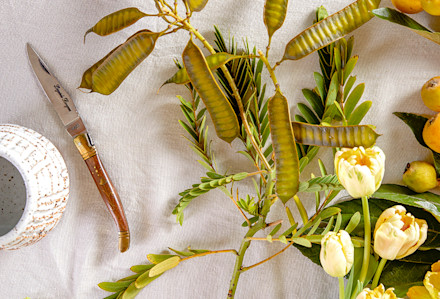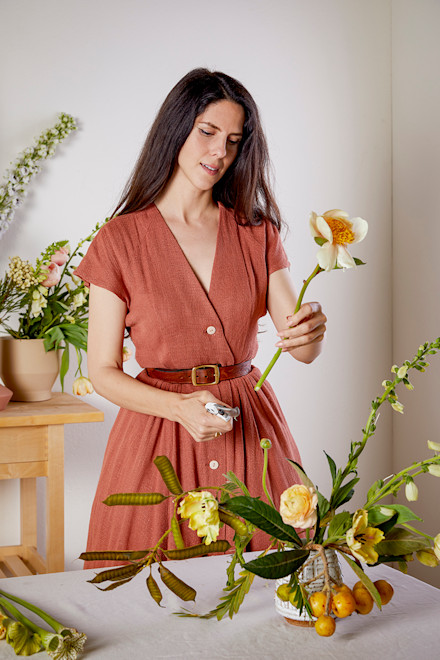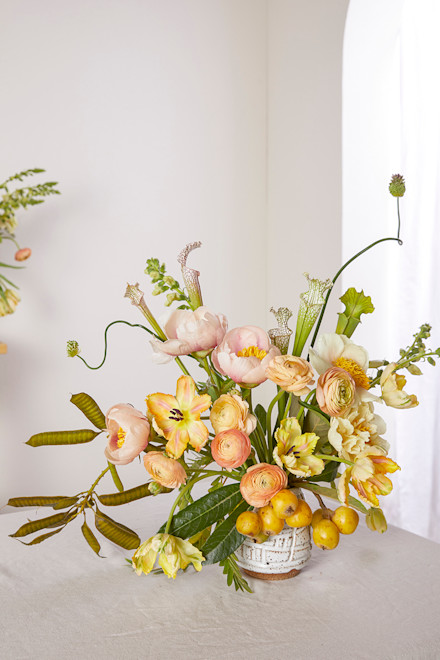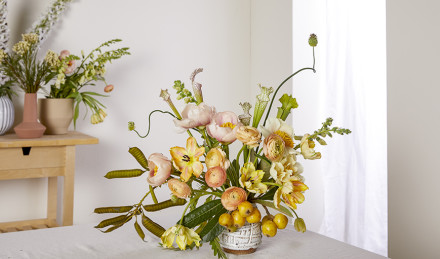There’s something to be said for coming home to fresh flowers. Not only are bouquets instantly chic, but they add a touch of nature – and they're proven to make you happier. For times when a simple bouquet of eucalyptus just won’t cut it, we called upon L.A.-based floral designer, Yasmine Mei, for her tips on creating easy and elegant floral arrangements at home. Using a unique combination of seasonal blooms and foraged finds, Yasmine walked us through how to create the perfect spring arrangement using our Mt. Washington for Parachute Handmade Ceramic Vase.

Select Your Vessel + Gather Tools
Depending on the mouth of the vase, add chicken wire to hold the flowers in place. Chicken wire is preferable to foam which can be toxic to the stems, but you can also go rogue and trust the flowers to support one another. Next add water to your vase and prepare your tools. Floral shears are best for cleanly cutting stems, followed by garden clippers.
Select Your Vessel + Gather Tools
Depending on the mouth of the vase, add chicken wire to hold the flowers in place. Chicken wire is preferable to foam which can be toxic to the stems, but you can also go rogue and trust the flowers to support one another. Next add water to your vase and prepare your tools. Floral shears are best for cleanly cutting stems, followed by garden clippers.
Choose Your Flowers
Source from a local flower market or neighborhood farmer’s market where vendors are more likely to know each species’ characteristics and needs. Yasmine recommends thinking outside of the box. If you have neighbors who are kind enough to allow you to pick from their garden, look to unlikely vegetation for a surprising addition. She also advises seeking out a variety of textures, shape and color. If a monochromatic arrangement is your goal, go for different shades of the same color. For this arrangement uses Popcorn Cassia (picked from Yasmine’s parent’s garden), peonies, loquats, pitcher plants (also known as the cobra lily), buttercups (also known as ranunculuses) and more seasonal blooms.
Choose Your Flowers
Source from a local flower market or neighborhood farmer’s market where vendors are more likely to know each species’ characteristics and needs. Yasmine recommends thinking outside of the box. If you have neighbors who are kind enough to allow you to pick from their garden, look to unlikely vegetation for a surprising addition. She also advises seeking out a variety of textures, shape and color. If a monochromatic arrangement is your goal, go for different shades of the same color. For this arrangement uses Popcorn Cassia (picked from Yasmine’s parent’s garden), peonies, loquats, pitcher plants (also known as the cobra lily), buttercups (also known as ranunculuses) and more seasonal blooms.

Design the Arrangement
This is the fun part. Get creative and play with height, weight and color. When creating a low arrangement, like ours, avoid making it top heavy by stepping away to see what works and how it looks at eye level.
Design the Arrangement
This is the fun part. Get creative and play with height, weight and color. When creating a low arrangement, like ours, avoid making it top heavy by stepping away to see what works and how it looks at eye level.

Edit the Bouquet
Lastly, remove any leaves that are in competition with the flowers. This will prolong the life of each flower as leaves submerged in water will start to collect bacteria and disintegrate. Fin! Enjoy your arrangement in your home for the week – or weeks – to come.
Edit the Bouquet
Lastly, remove any leaves that are in competition with the flowers. This will prolong the life of each flower as leaves submerged in water will start to collect bacteria and disintegrate. Fin! Enjoy your arrangement in your home for the week – or weeks – to come.




